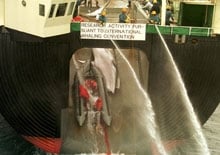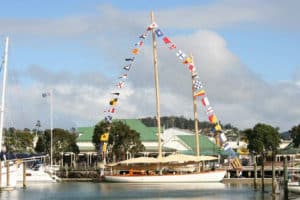
AtSeaWhale
Just a day after a Japanese whale-hunting expedition ended in a deadly fire, anti-whaling nations New Zealand and Australia vowed to continue their fight to end the annual hunts.
On February 28, a crewman died in a fire that engulfed the mother ship of Japan’s whaling fleet and left it drifting in the South Pacific near the Antarctic coast. New Zealand officials blasted the incident, saying leaking fuel could have caused a major ecological disaster in an area rich with rare wildlife and fragile plant life. Japanese officials, however, maintain the event posed no threat to the environment and won’t cause them to call off future kills.
Japan holds fast to the claim that its whaling program, which targets minke, fin, and humpback whales, provides crucial scientific data for the International Whaling Commission, which sanctions the annual hunts. Data collected includes population counts, feeding habits, and distribution of the mammals in the seas near Antarctica.
Environmental groups like Greenpeace, on the other hand, say the “research” is just a pretext for Japan to keep its whaling fleet afloat despite an international ban on commercial whaling imposed by the IWC in 1986.
New Zealand Conservation Minister Chris Carter has plans to attend the ICW’s annual meeting in Alaska in May, and will continue to voice his country’s opposition to the program. Similarly, Australia’s Environment Minister Malcolm Turnbull said, “The Australian government will continue to fight with many nations around the world to ensure that scientific whaling ceases.”







